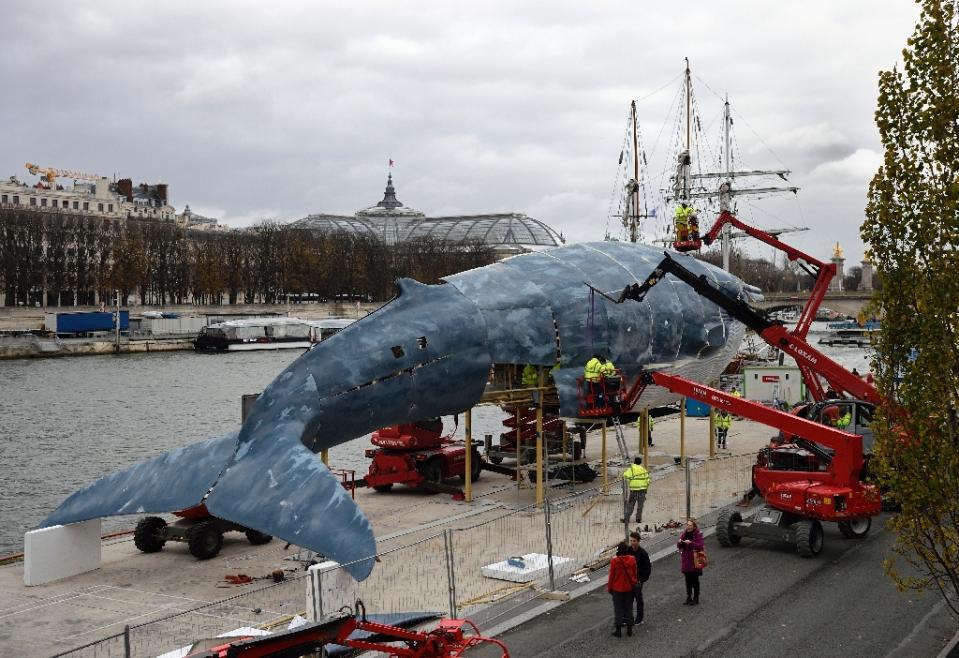Le Bourget (France) (AFP) – World leaders opened an historic summit in the French capital on Monday aimed at ending decades of political gridlock and forging an elusive agreement to avert calamitous global warming.
The leaders kicked off 12 days of negotiations in search of a pact that would radically restructure the global economy away from its dependancy on fossil fuels that are blamed for climate change.
More than 150 leaders gathered at a sprawling conference centre on the northern outskirts of Paris under heavy security following this month’s terror attacks in the city, which appeared to have galvanised commitment for climate action.
Scientists warn that, unless action is taken soon, mankind will endure ever-worsening catastrophic events, such as droughts that will lead to conflict and rising sea levels that will wipe out low-lying island nations.
But world leaders have also vowed to forge an ambitious deal to honour the 130 people killed in the November 13 attacks that were claimed by the Islamic State group.
“The fate of humanity is at stake in this conference. After the attacks in France, we have to deal with the urgent priorities and respond to the terrorist challenge but also act for the long term,” French President Francois Hollande said.
In an interview with French daily newspaper “20 minutes”, Hollande said leaders would meet in Paris “to reaffirm their solidarity with France” and to “assume their responsibilities in the face of the warming of the planet”.
“History will judge the heads of state and government harshly if, in December 2015, they miss this opportunity.”
– Stumbling blocks –
US President Barack Obama’s first act after touching down in Paris early on Monday was to visit the scene of the worst carnage at the Bataclan concert venue.
The summit is “an opportunity to stand in solidarity with our oldest ally… and reaffirm our commitment to protect our people and our way of life from terrorist threats,” Obama said in a Facebook post before flying to Paris.
The United Nations has hosted annual summits to tackle the vexed global warming issue since 1995, but all previous efforts have foundered, primarily due to deep divisions between rich and poor nations.
Many poor nations insist rich countries bear the most responsibility for tackling the problem because they have burnt the most fossil fuels since the Industrial Revolution on their way to prosperity.
“Justice demands that, with what little carbon we can still safely burn, developing countries are allowed to grow,” Indian Prime Minister Narendra Modi wrote in a column in the Financial Times.
“The lifestyles of a few must not crowd out opportunities for the many still on the first steps of the development ladder.”
But the United States and other developed nations insist more must be done by China, India and other emerging countries, which are burning increasing amounts of coal to power their fast-growing economies.
In a timely illustration of the immediate ramifications of rampant coal burning, poisonous smog enveloped Beijing and other parts of northern China on Monday.
Potential stumbling blocks in Paris range from providing finance for climate vulnerable and poor countries, to scrutiny of commitments to curb greenhouse gases and even the legal status of the accord.
Still, important progress has been made ahead of the meeting. One of the key successes has been a process in which 183 nations have submitted voluntary action plans on how they would tackle global warming.
UN climate chief Christiana Figueres said these provide the architecture for more ambitious efforts that could eventually limit global warming to less than two degrees Celsius (3.6 degrees Fahrenheit) from pre-Industrial Revolution levels.
Two degrees Celsius is the threshold at which scientists say the worst impacts of global warming will be inevitable.
Monday’s summit is also the biggest gathering of world leaders to tackle climate change.
“And who says climate is not on the political agenda,” Figueres said in a Twitter post on Monday, referring to the record-breaking number of leaders.
– ‘No planet B’ –
To pressure world leaders into forging an agreement, more than half a million people participated in climate protests around the world over the weekend.
“There is no planet B” and “Our Children Need a Future” read placards held by some of the 50,000 people who turned out in London’s Hyde Park, in scenes replicated across the world.
“The charge from the streets for leaders to act on climate has been deafening, with record numbers turning out across the world,” said Emma Ruby-Sachs, campaign director for Avaaz, one of the organisers.
French authorities had banned protests in Paris due to security fears following the terror attacks.
But in a show of defiance and determination to have their voices heard on climate change, thousands of people in Paris gathered to create a two-kilometre (1.2-mile) human chain.
Their stand was disrupted, however, when a band of anti-capitalist militants infiltrated the protests, leading to clashes with riot police which saw hundreds of arrests. Some 317 people were in custody, police sources said Monday.
On a more artistic precursor to the talks, the Eiffel Tower was turned green on Sunday as part of an art project that will see “virtual trees” grow on the landmark to support reforestation.











